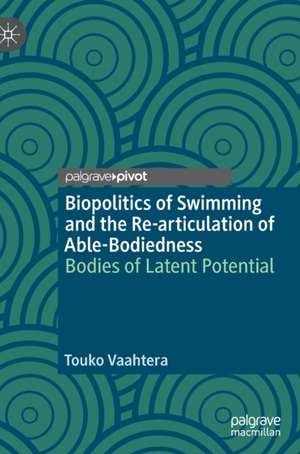Biopolitics of Swimming and the Re-articulation of Able-Bodiedness: Bodies of Latent Potential
Autor Touko Vaahteraen Limba Engleză Hardback – 3 iul 2022
Vaahtera explores how swimming skills emerged as a specific biopolitical question in Finland, a country that has been described as the “Land of a Thousand Lakes.” Through a profound cultural analysis focusing both on Finnish cultural texts on swimming as well as manifold more globalized texts, Vaahtera considers how the legacy of eugenics and colonialism, the hopes of civilization, and homogenizing assumptions about bodies frame how we think about human capacity.
Preț: 384.09 lei
Nou
Puncte Express: 576
Preț estimativ în valută:
73.50€ • 80.16$ • 61.97£
73.50€ • 80.16$ • 61.97£
Carte tipărită la comandă
Livrare economică 24 aprilie-08 mai
Preluare comenzi: 021 569.72.76
Specificații
ISBN-13: 9783031062735
ISBN-10: 3031062736
Pagini: 128
Ilustrații: XI, 128 p. 3 illus.
Dimensiuni: 148 x 210 x 17 mm
Greutate: 0.32 kg
Ediția:1st ed. 2022
Editura: Springer International Publishing
Colecția Palgrave Macmillan
Locul publicării:Cham, Switzerland
ISBN-10: 3031062736
Pagini: 128
Ilustrații: XI, 128 p. 3 illus.
Dimensiuni: 148 x 210 x 17 mm
Greutate: 0.32 kg
Ediția:1st ed. 2022
Editura: Springer International Publishing
Colecția Palgrave Macmillan
Locul publicării:Cham, Switzerland
Cuprins
1 Introduction: Re-articulation of Able-Bodiedness.- 2 Bodies of Latent Potential.- 3 Miscellaneous Ambitions around the Fit Citizenship: Genealogy of the Ability to Swim.- 4 The Real Body and the Repressive Hypothesis of the Body.- 5 Able-Bodied Belonging: Human Beings as Part of the Animal World.- 6 Epilogue.
Notă biografică
Touko Vaahtera is a Postdoctoral Researcher at the Department of Social Sciences at the University of Eastern Finland. They are the editor of Troubling Educational Cultures in the Nordic Countries (2017).
Textul de pe ultima copertă
"This wonderfully written book subjects swimming to a much-needed queer and disability analysis. Vaahtera asks us to reconsider the innocence of the question— can you swim?—and to explore together wider societal assumptions that we hold over ourselves and others associated with capacity, capability, and ability."
—Dan Goodley, Professor of Disability Studies and Education, University of Sheffield, UK
"Tackling urgent questions regarding the biopolitics of transnational and local bodily 'capabilities,' Touko Vaahtera challenges us to examine how we oriented towards able-bodiedness. Focusing on a wide range of cultural texts, and challenging what we might understand as both culture and text, this book offers a queercrip methodology for analysing the intersectional politics of embodied, collective living. It opens up how we read, understand and experience collective bodily norms and their contexts, whilst offering specifically queercrip ways of imagining alternative modes of being."
—Donna McCormack, School of Humanities, University of Strathclyde, Scotland
In this book, Touko Vaahtera explores how “bodies of latent potential,” a cultural attachment to the idea of body as potentiality, carries with it hierarchizing hopes about better bodies. Vaahtera combines disability studies, cultural studies, feminist science studies, transgender studies, post-colonial studies, and Foucauldian genealogy to offer a provocative approach that interrogates capacities and capabilities as obvious frameworks for thinking about the body.
Vaahtera explores how swimming skills emerged as a specific biopolitical question in Finland, a country that has been described as the “Land of a Thousand Lakes.” Through a profound cultural analysis focusing both on Finnish cultural texts on swimming as well as manifold more globalized texts, Vaahtera considers how the legacy of eugenics and colonialism, the hopes of civilization, and homogenizing assumptions about bodies frame how we think about human capacity.
Touko Vaahtera is a Postdoctoral Researcher at the Department of Social Sciences at the University of Eastern Finland. They are the editor of Troubling Educational Cultures in the Nordic Countries (2017).
—Dan Goodley, Professor of Disability Studies and Education, University of Sheffield, UK
"Tackling urgent questions regarding the biopolitics of transnational and local bodily 'capabilities,' Touko Vaahtera challenges us to examine how we oriented towards able-bodiedness. Focusing on a wide range of cultural texts, and challenging what we might understand as both culture and text, this book offers a queercrip methodology for analysing the intersectional politics of embodied, collective living. It opens up how we read, understand and experience collective bodily norms and their contexts, whilst offering specifically queercrip ways of imagining alternative modes of being."
—Donna McCormack, School of Humanities, University of Strathclyde, Scotland
In this book, Touko Vaahtera explores how “bodies of latent potential,” a cultural attachment to the idea of body as potentiality, carries with it hierarchizing hopes about better bodies. Vaahtera combines disability studies, cultural studies, feminist science studies, transgender studies, post-colonial studies, and Foucauldian genealogy to offer a provocative approach that interrogates capacities and capabilities as obvious frameworks for thinking about the body.
Vaahtera explores how swimming skills emerged as a specific biopolitical question in Finland, a country that has been described as the “Land of a Thousand Lakes.” Through a profound cultural analysis focusing both on Finnish cultural texts on swimming as well as manifold more globalized texts, Vaahtera considers how the legacy of eugenics and colonialism, the hopes of civilization, and homogenizing assumptions about bodies frame how we think about human capacity.
Touko Vaahtera is a Postdoctoral Researcher at the Department of Social Sciences at the University of Eastern Finland. They are the editor of Troubling Educational Cultures in the Nordic Countries (2017).
Caracteristici
Offers new approaches to disability theory Interrogates the assumptions of capability and capacity Engages with disability studies, gender studies, feminist studies, & Foucauldian studies, among others
